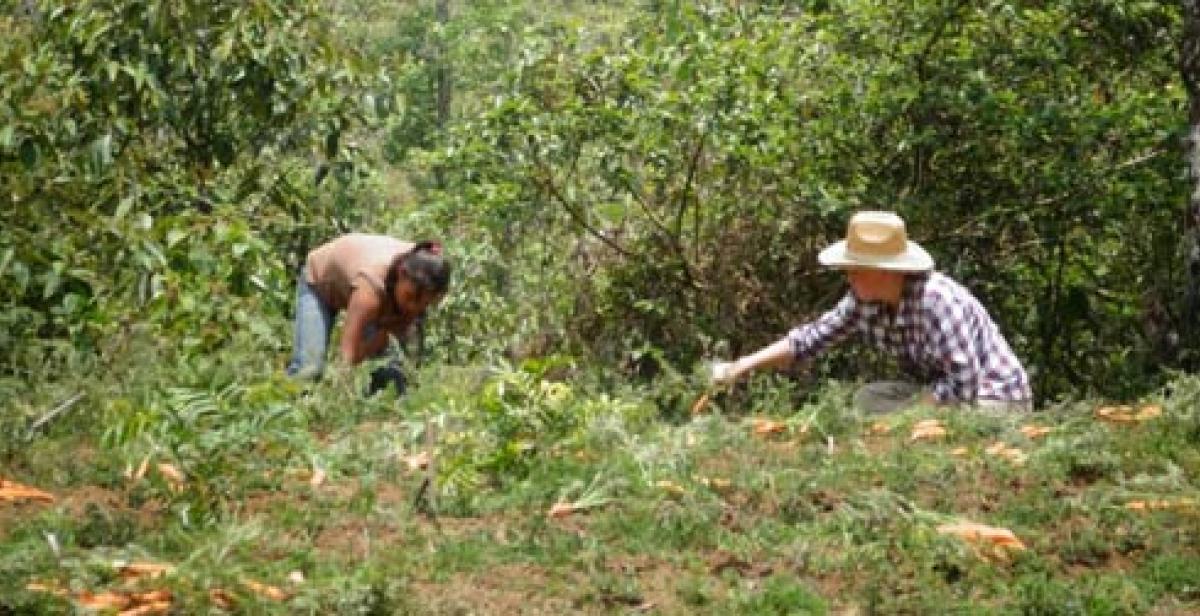One of the intentions of Progressio and the partner organisation COMUCAP is to give local women the chance to improve their confidence as well as exchanging cultural understanding with the volunteers. Even in the short time we have been working on Alba’s farm her confidence has noticeably grown. She is proud of the fact that she could teach us how to turn the soil, to make beds ready for planting and lay out an irrigation system effectively. We learnt a lot from her and her family.
Progressio has been working with Alba for almost 4 years. Women from COMUCAP first went to her, then Progressio development worker, Roger Diaz, helped show Alba and her family how to make her farm more successful. Alba explains that life was difficult before then. She told us, “we didn’t have any confidence as a group, we didn’t have trust in projects until COMUCAP arrived and integrated us into their cooperative.”
When her crops failed, Progressio and COMUCAP helped; they have provided her with valuable resources such as a chalk composite which helps balance the acidity of the soil on her farm naturally. They have provided organic fertilizers and organic products to fumigate the area, “they have always been helping us in this way, right from the beginning of the project.” Alba has not had to pay for any part of the scheme, but told us that as a group they have invested a part of their profits and hope to buy a water tank for the irrigation system. In addition to this financial and technical aid, we volunteered on the farm for a week. This meant that work which would have taken her weeks was completed before the rains at the weekend. Now Alba will be able to plant her new crop and we will go back to help her weed and maintain the beds to ensure a fruitful and healthy harvest.
The carrot crop of this harvest, however, won’t sustain Alba and her family for very long. She sells them at the market in Marcala, but they like carrots to be big in Honduras, “you have to grow them big otherwise you can’t sell them.” The women of the group also work picking coffee at nearby farms but this is seasonal. They have to rely on their other crops for the rest of the year. Next season Alba and the women plan to develop their own small coffee plantation on the farm. Glenda, the Central American regional director for Progressio, told us “the money they make from their crops may be small but that 1000 Lempiras mean a lot for those people and they can do so much with it.”
Alba lives in a basic, traditional mud brick Honduran home with her 2 year old daughter, Lourdes. They have no clean running water at the house, just a simple outdoor toilet with a towel for a door and a bucket of dirty water to wash. Mosquitos are abundant here, while we worked we were bitten profusely, and Lourdes’ arms were covered in old bites which made her scratch and cry.
When we asked her what her plans for the future were, Alba told us that she thought she would always live and work in her community near Marcala, but her daughter’s father lives in the capital city, Tegulcigalpa. “If he takes us there to live, we’ll go.” This shocked us a bit as, although life is clearly very challenging here, Tegulcigalpa is a very dangerous city, where jobs are scarce and many neighbourhoods are no more than shanty towns run by violent gangs. This highlights the problem of rural to urban migration in developing countries. For this reason, Progressio and COMUCAP are trying to show women like Alba that they can make a successful living on their small holdings and stay living in safer rural communities.
Written by Rose Forman and Alice Pepper, interview translated by Katie Sims



